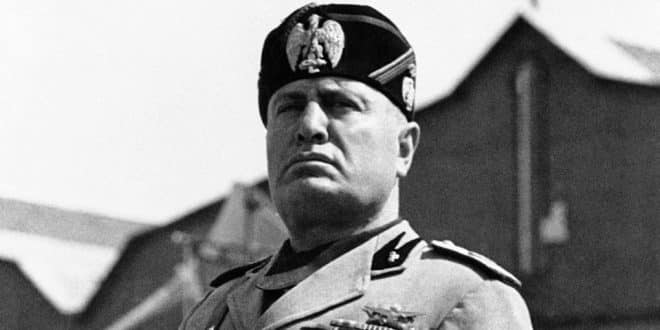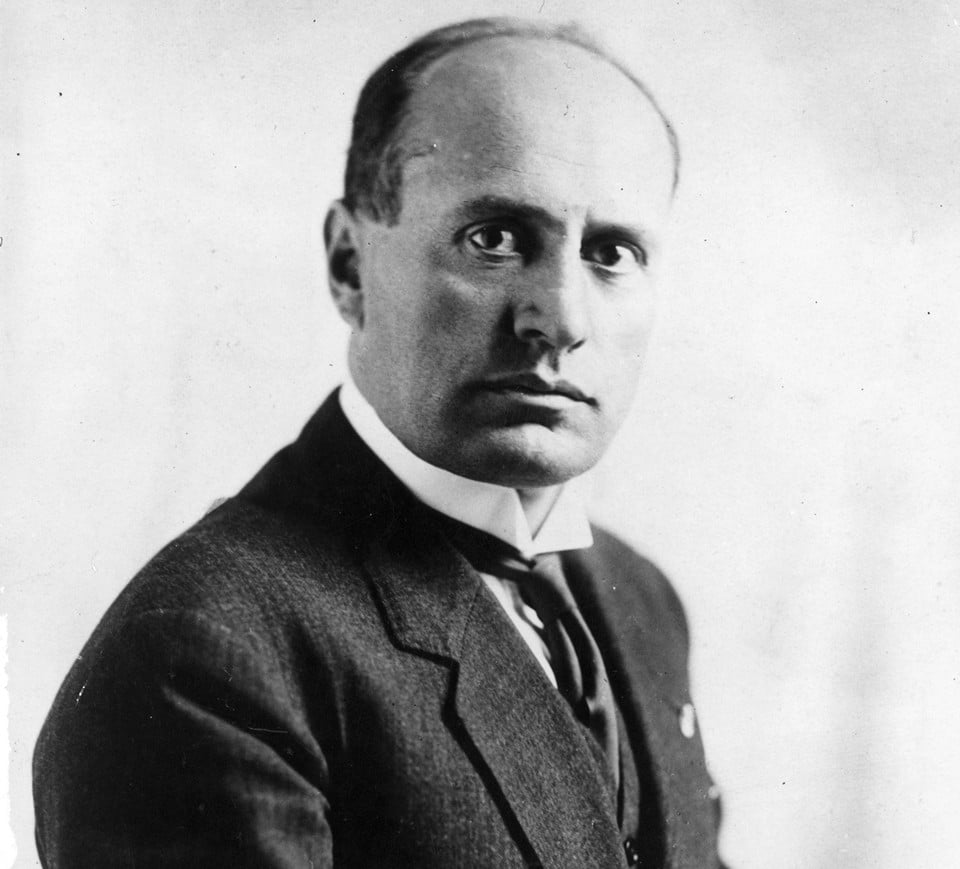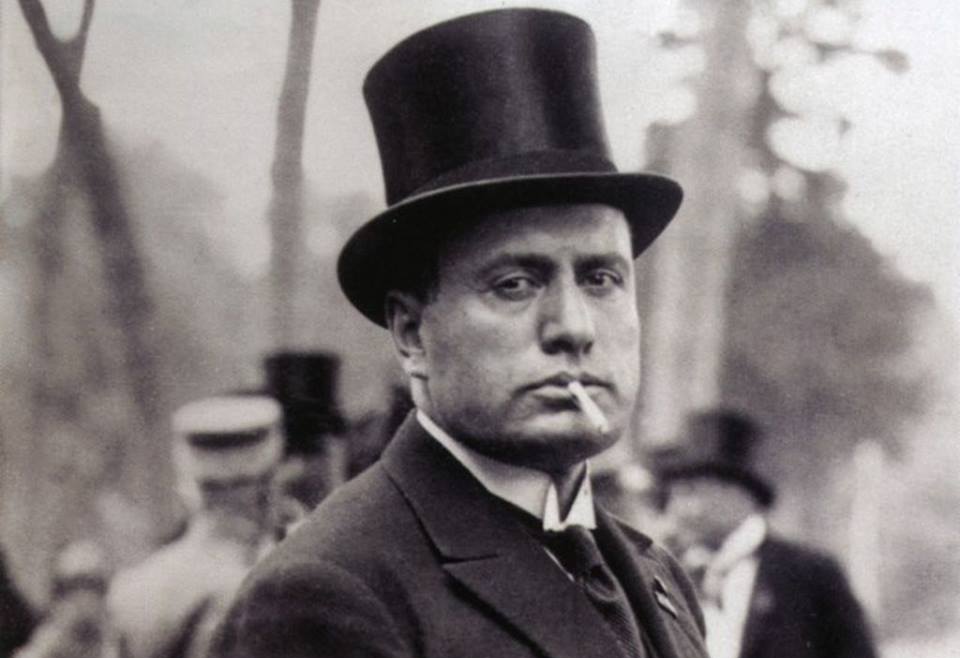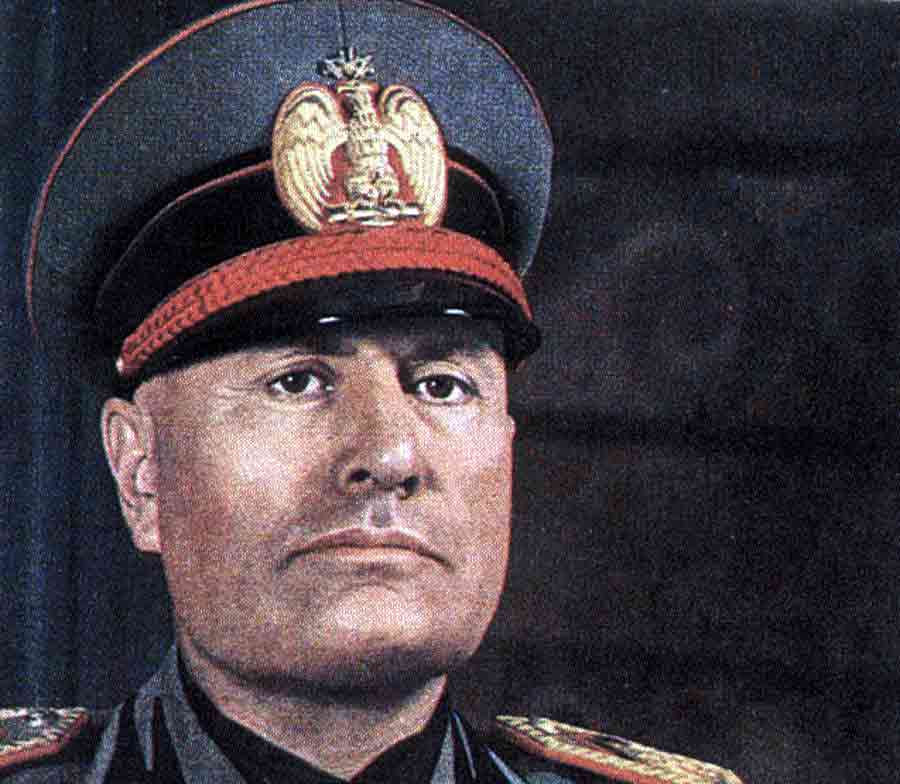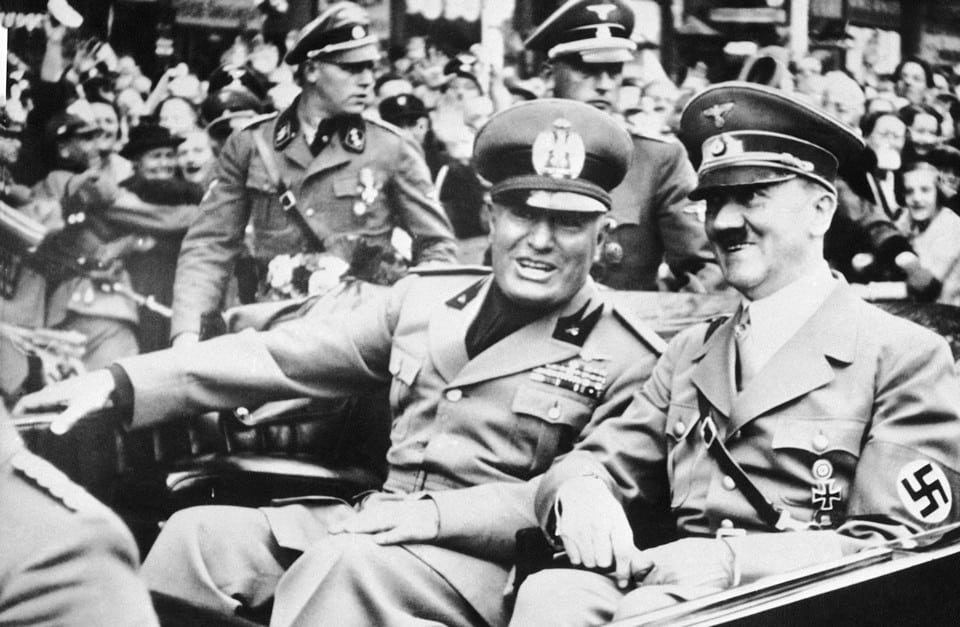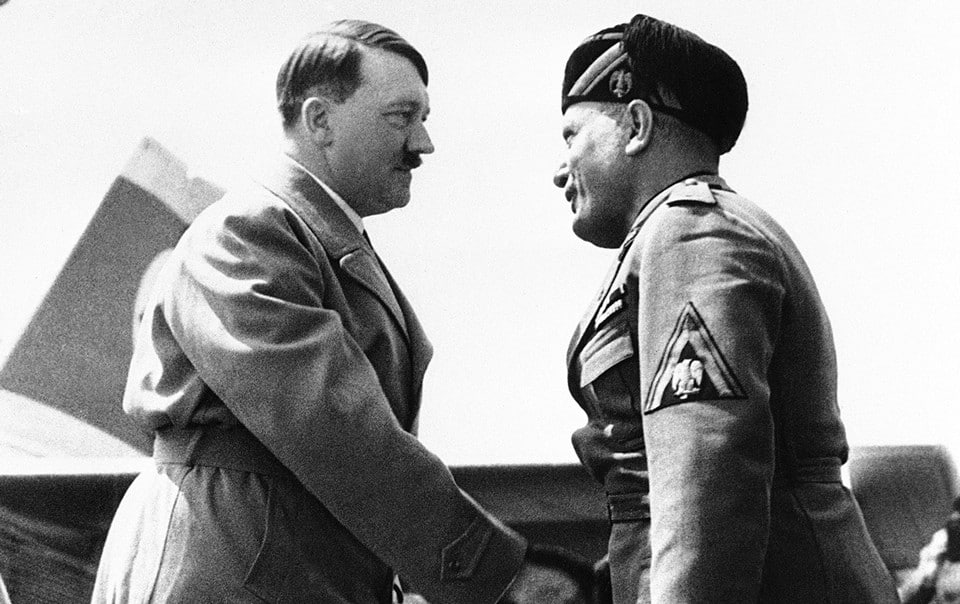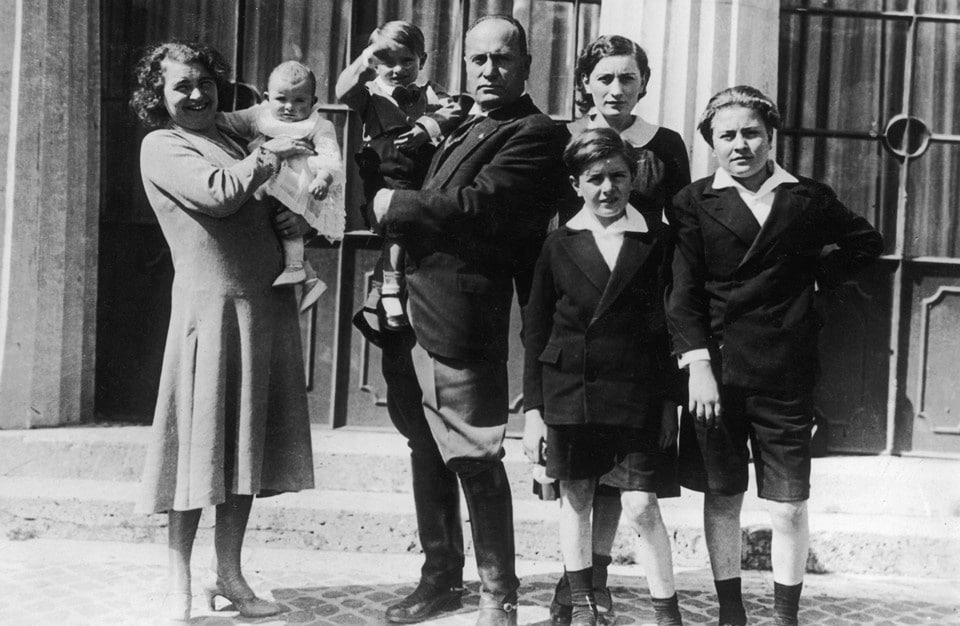Benito Mussolini, an Italian politician, was the leader of the fascist movement, author of articles, and served as the Prime Minister from 1922 to 1943. He started his political career as a member of the Socialist Party, from which he was later expelled.
In 1919, Mussolini founded the fascist party. On October 28, 1922, through a coup, he seized power and on November 1, became the head of the government. He declared himself dictator, organized and supported fascist terrorism, and pursued an aggressive foreign policy by invading neighboring states. He joined Germany in World War II. In 1945, he was sentenced to execution by Italian partisans.
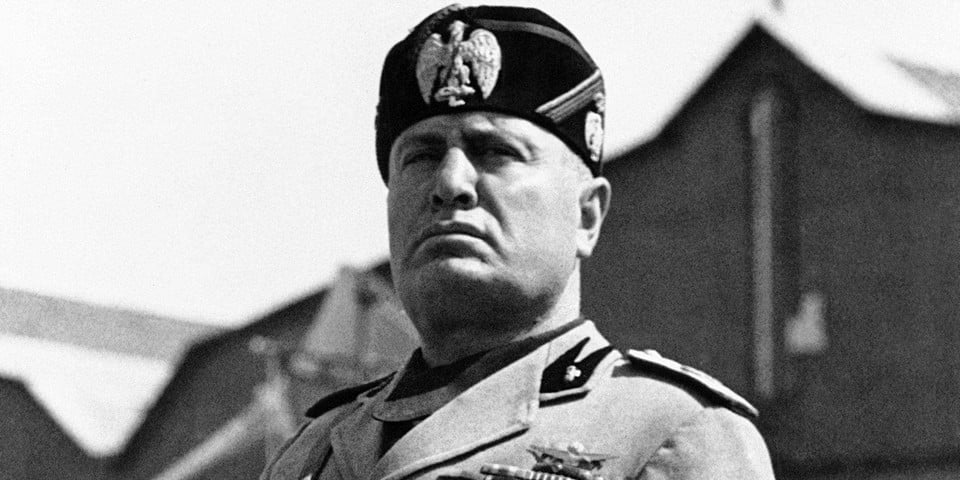
Page Contents
Biography
Benito Mussolini was born on July 29, 1883, in the small Italian village of Varano, near Predappio (where his house-museum is located today, 70 km from San Marino). His parents were Alessandro, a blacksmith, and Rosa Maltoni, a schoolteacher. They lived in three small rooms on the second floor of a three-story building. Mussolini’s mother was known for her devout Catholicism, but due to disagreements between the parents regarding religion, Mussolini was baptized at a later age, rather than as an infant.
His father, who did not receive formal education, had a keen interest in politics and rejected theology. He often led protests and ended up in prison, idolizing the revolutionary Bakunin. Mussolini’s father named him after Mexican President Benito Juárez for his first name, and his second and third names, Andrea and Amilcare, were inspired by the leaders of the socialist party, Costa and Cipriani. The political views of his father strongly influenced Mussolini’s worldview, to the extent that he became a member of the Socialist Party at the age of 17.
The couple could never have imagined that their firstborn would become a ruthless dictator and the leader of Italy’s fascist party. Mussolini’s regime established a terrifying totalitarian system and a time of political repression in the country.
Education and Service
The family had financial difficulties, but despite that, Benito received an education. However, it was not the financial constraints that posed a challenge, but rather his son’s impulsive and unrestrained character inherited from his father. Due to his fights, he was expelled twice from the church school in Faenza, where he studied from the age of 9. Shortly after enrolling in school, he quarreled with older students and stabbed one of them with a knife. In 1895, he was transferred to another school, where he continued to assert his leadership among his peers. His cruelty, anger, and frequent fights often led to meetings between Mussolini’s teachers and parents. Similar problems arose during his time in high school. However, his mother tearfully approached the school directors to ensure that her son could complete his education. He managed to obtain a diploma as a primary school teacher despite the difficulties.
In 1902, the young man was supposed to be conscripted into service, but upon the advice of Alessandro Mussolini, he left for Geneva, Switzerland. There, he tried working as a mason but abandoned the occupation and became a vagabond. His ability to read and speak eloquently, as well as his limited knowledge of the French language, became significant assets for him. In Lausanne, the young man met the scientist Pareto and attended his lectures. His acquaintance with Angela Balabanova and Vladimir Ulyanov Lenin introduced the young man to political theorists such as Marx, Sorel, and Nietzsche. Sorel particularly impressed Mussolini, and his works on the overthrow of liberal democracy through violence without moral constraints resonated deeply within the young man’s heart.
In 1903, the Italian police requested the Swiss authorities to arrest Mussolini, who was evading military service. He was deported back, and in 1904, after serving his sentence, he was called up to the army.
After serving two years in Verona and receiving an award for his service, he returned home.
Teaching Activities
Engaging in teaching at a rural school, Benito simultaneously published his own newspaper, in which he printed his own articles. Even then, he understood that periodicals were an excellent means of conveying his ideas to the masses. By publishing articles on the flaws of bourgeois society, the editor doubled the circulation in a short period. His public political provocations frequently led to his arrest by the police, and he even spent time in prison. Throughout this time, Mussolini addressed the public, honing his oratory skills. Thus, from being a “little duce” (leader), he gradually transformed into simply Il Duce.
In Tolmezzo, Mussolini worked as the deputy director of a school. The students loved their peculiar teacher, who read poetry aloud, and they got along well with him. In 1907, he was given the opportunity to teach French, and in 1908, he transferred to a college as a professor. Benito taught geography, Italian language, and history.
In late 1908, he moved to Forlì to live with his father, where they rented a room. His mother had died during his military service.
Work as a Political Journalist
In early 1909, Benito moved to Austro-Hungary (the city of Trento), where he became the editor of the daily newspaper “The Worker’s Future” and the secretary of the Labor Center. His acquaintance with the political journalist Cesare Battisti allowed Mussolini to become the editor of the newspaper “The People” and write the work “The Cardinal’s Mistress.” It was serialized in “The People” over the course of a year. Later, when Benito reached a peace agreement with the Vatican, the novel was confiscated.
In 1910, he arrived in Forlì, where he worked as the editor of “Class Struggle.” Mussolini’s radical views developed not from a deep understanding of the situation but rather from a thirst for self-assertion.
His importance and fame within the socialist party rapidly grew thanks to his journalistic talent. Effortlessly, with accessible language, he produced numerous articles with vivid headlines and captivating topics. He sensed what the masses wanted to hear and gave it to them.
In 1911, Mussolini organized a protest against the war in Libya, which led to further problems with law enforcement. He was sentenced to six months in prison. Upon his release, he played a role in the expulsion of Bonomi and Bissolati, socialist party members who supported the war. As a result, Mussolini was appointed as the editor of the political periodical “Avanti,” which is still published to this day. During his tenure as editor, the newspaper’s circulation increased fivefold. Mussolini relocated to Milan, where he attended his party’s congress in Emilia and applauded a mason’s attempt on the life of the king, encouraging similar actions in his own country.
Change of Views
Unexpectedly, an article by the chief editor of “Avanti” advocating for military action against Germany appeared in the newspaper. It stated that German actions would deprive Europe of its freedom and emphasized the need to side with France. The publication’s management requested an explanation from Mussolini, but he began to argue and was dismissed from his position.
He began traveling across the country, delivering political speeches. Mussolini succinctly and vividly described German soldiers as pirates and Austrian soldiers as executioners of the Italian people. He accused socialists of international selfishness and an inability to understand the people.
Italy entered the war in August 1915, and Mussolini found himself serving with the Bersaglieri, who fought near the Isonzo River. Mussolini showed bravery and optimism, but after three months, he contracted typhus and was hospitalized. In February 1916, he was promoted to the rank of corporal. Exactly one year later, he was severely wounded in the leg due to a mine explosion. The surgeon removed over 40 fragments from Mussolini’s leg, and he kept two of them as mementos. They are currently preserved in the leader’s family residence. After being demobilized, Mussolini returned to the rear, but Austria defeated Italy.
Fascist Party
The tragedy faced by the Italian people played into the hands of an ambitious Italian seeking power. In 1917, disillusioned and exhausted soldiers became the stronghold of a new party called the “Combat Union” (fascio di combattimento). The Italian word “fascio” gave the name to the most ruthless political movement – fascism. Mussolini understood that socialism had outlived its usefulness, and the country needed strong and radical leaders to govern.
In May 1921, Mussolini’s party, with the support of liberal leader Giovanni Giolitti, secured 35 seats in the Chamber of Deputies. On November 7, 1921, the party adopted a new name, the “National Fascist Party.”
Mussolini’s journey took a unique path. Armed squads (“Blackshirts”) composed of war veterans were organized by the fascists to impose order on the streets with an iron fist. Socialists, as well as communists and anarchists, engaged in constant clashes with these squads. The government’s actions barely restrained the former military personnel, and more and more people joined the fascist party. In 1921, Mussolini took his place in the Chamber of Deputies.
The Rise of Mussolini to Power
On October 27, 1922, thousands of organized fascist supporters marched towards Rome. Government troops could have easily stopped them, but Victor Emmanuel III refused to declare a state of emergency, fearing civil war and a government overthrow.
Emmanuel III appointed the leader of the party as the Prime Minister. In the evening, they jointly welcomed the entering fascists into the city. On October 30, 1922, the formation of the new government was completed, and under pressure, the Parliament expressed confidence in the newly organized Cabinet. Mussolini was given a villa.
On April 10, 1923, Mussolini met with Cardinal Pietro Gasparri at the Vatican. He promised to rid the country of communists and reintroduce Christianity, symbolized by the crucifixion of Christ, into schools and courts. Through cunning manipulations, the Vatican supported fascism and gained the status of a separate state.
Consolidation of Power
In 1923, according to the new electoral law, a party that received 1/4 of the votes would secure 66% of parliamentary seats, granting privileges to the fascists. When socialist Giacomo Matteotti attempted to expose the falsified election results, he was assassinated on June 10, 1924.
Deputies from other parties left the parliament and formed the opposition “Aventine Bloc.” In 1926, an assassination attempt was made on Mussolini, leading to the immediate imposition of a state of emergency and the prohibition of all parties except the fascists. Mussolini’s fascist regime established a strict dictatorship. Orders were issued to create secret security agencies and a tribunal of security. These new structures were aimed at suppressing any dissent.
The monarch held the throne only symbolically. Mussolini headed seven ministries in virtually all the armed forces. He propagated his cult of personality and held all the power in his hands, manipulating laws and abolishing parliamentary elections.
Benito Mussolini’s Reforms
Mussolini, a far-sighted and intelligent leader, understood that threats and oppression alone wouldn’t feed the people. He initiated a period of economic and social recovery in the country. As part of the “Green Revolution” aimed at reducing unemployment, he oversaw the construction of over 5,000 farms and 5 agricultural towns. This led to the reclamation and cultivation of the Pontine Marshes. The land reclamation program freed up 8 million hectares of arable land, which was distributed to the poorest peasants. Numerous hospitals were built, and Mussolini nearly eradicated the Sicilian Mafia.
Foreign Policy
Mussolini’s goal was to revive the Roman Empire. He orchestrated the expansion of armed forces into Ethiopia, the Mediterranean, and Albania.
The Spanish Civil War of 1936-1939 forced the dictator to support the nationalists in order to prevent the victory of the communists. General Francisco Franco Bahamonde was supported by both Mussolini and Adolf Hitler, with whom Mussolini had been growing closer since 1936. In 1939, Germany and Italy signed an alliance, and Italy officially entered World War II on June 10, 1940. Italian forces participated in the invasion of France and attacked British colonies in Africa before entering Greece.
Soon, the anti-Hitler coalition launched offensives on all fronts, and Italy was forced to retreat, giving up its positions. In 1943, British forces entered Sicily.
Downfall of the Dictatorship
Hitler and Mussolini suffered defeat. The people, who had been dragged into the war, held their premier accountable. They remembered all the aggressive and unlawful actions. As a result, Mussolini was arrested by his own associates and imprisoned in the mountains. The Germans rescued Mussolini and entered Italy. In April 1945, the dictator attempted to flee the country but was captured by partisans and executed along with his lover, Clara Petacci.
Family
Mussolini’s first wife was Ida Dalser, whom he married in 1914. They had a son together named Benito Albino. However, both his wife and son died in a mental institution, and Mussolini made efforts to keep their deaths secret. After some time following the birth of his first son, Mussolini formalized his relationship with his longtime mistress since 1910, Rachele Guidi. They had five children together. Throughout his life, Mussolini had numerous mistresses and extramarital affairs.
Interesting Facts about Mussolini
- Mussolini displayed exceptional intellectual abilities at a young age. He began reading independently at the remarkable age of 4 and demonstrated musical talent by starting to play the violin at 5 years old.
- Despite being a highly controversial figure, Mussolini faced numerous assassination attempts throughout his life. Astonishingly, there were a total of six documented attempts on his life, but none of them succeeded in eliminating the dictator.
- Mussolini was not only involved in politics but also had a passion for various physical activities. He engaged in skiing, running, car sports, swimming, and frequently played football, showcasing his active and diverse interests.
- When Mussolini sought the consent of his first wife’s parents for their marriage, they initially refused. However, Mussolini resorted to extreme measures and, reportedly, threatened them with a gun, ultimately leading to their approval.
- Mussolini had a close brush with death during his military service. In a tragic incident, a shell exploded in the trench where he and his fellow soldiers were stationed, resulting in the loss of six lives. Remarkably, Mussolini narrowly escaped the explosion, defying the odds.
 Italy for me From Italy with love
Italy for me From Italy with love

